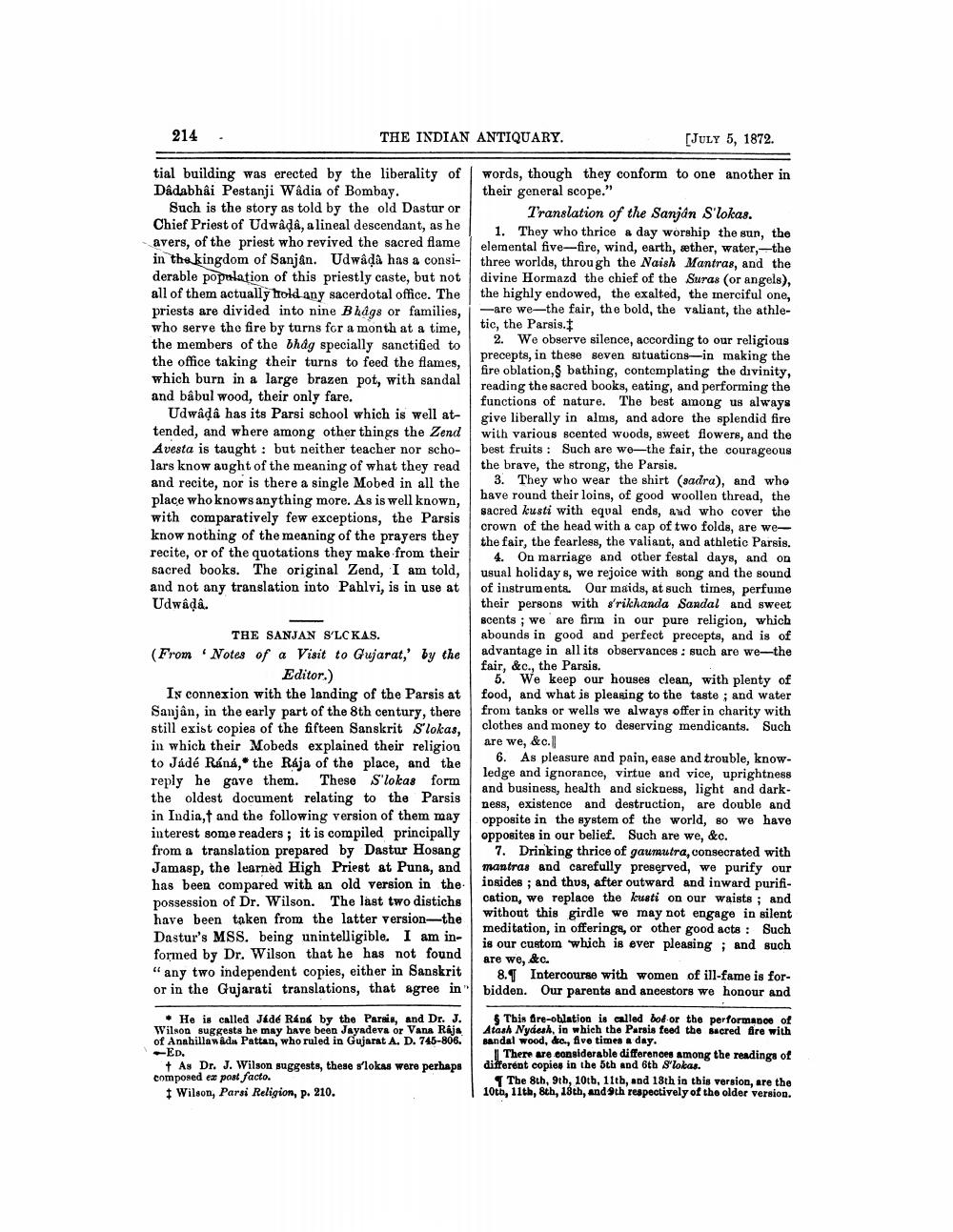________________
214
THE INDIAN ANTIQUARY.
[JULY 5, 1872.
tial building was erected by the liberality of words, though they conform to one another in Dadabhai Pestanji Wâdia of Bombay. their general scope."
Such is the story as told by the old Dastur or Chief Priest of Udwâdâ, alineal descendant, as he avers, of the priest who revived the sacred flame in the kingdom of Sanjân. Udwâdâ has a considerable population of this priestly caste, but not all of them actually hold any sacerdotal office. The priests are divided into nine Bhágs or families, who serve the fire by turns for a month at a time, the members of the bhag specially sanctified to the office taking their turns to feed the flames, which burn in a large brazen pot, with sandal and bâbul wood, their only fare.
Udwâḍâ has its Parsi school which is well attended, and where among other things the Zend Avesta is taught: but neither teacher nor scholars know aught of the meaning of what they read and recite, nor is there a single Mobed in all the place who knows anything more. As is well known, with comparatively few exceptions, the Parsis know nothing of the meaning of the prayers they recite, or of the quotations they make from their sacred books. The original Zend, I am told, and not any translation into Pahlvi, is in use at Udwâḍâ.
THE SANJAN S'LCKAS.
(From Notes of a Visit to Gujarat,' by the Editor.)
IN connexion with the landing of the Parsis at Sanjân, in the early part of the 8th century, there still exist copies of the fifteen Sanskrit Slokas, in which their Mobeds explained their religion to Jádé Ráná, the Raja of the place, and the reply he gave them. These Slokas form the oldest document relating to the Parsis in India,† and the following version of them may interest some readers; it is compiled principally from a translation prepared by Dastur Hosang Jamasp, the learned High Priest at Puna, and has been compared with an old version in the possession of Dr. Wilson. The last two distichs have been taken from the latter version-the Dastur's MSS. being unintelligible. I am informed by Dr. Wilson that he has not found "any two independent copies, either in Sanskrit or in the Gujarati translations, that agree in
He is called Jádé Ráná by the Parsis, and Dr. J. Wilson suggests he may have been Jayadeva or Vana Raja of Anabillawada Pattan, who ruled in Gujarat A. D. 745-806. -ED.
† As Dr. J. Wilson suggests, these s'lokas were perhaps composed ex post facto.
Wilson, Parsi Religion, p. 210.
Translation of the Sanjan Slokas.
1. They who thrice a day worship the sun, the elemental five-fire, wind, earth, sether, water, the three worlds, through the Naish Mantras, and the divine Hormazd the chief of the Suras (or angels), the highly endowed, the exalted, the merciful one, -are we the fair, the bold, the valiant, the athletic, the Parsis.
2. We observe silence, according to our religious precepts, in these seven situations-in making the fire oblation,§ bathing, contemplating the divinity, reading the sacred books, eating, and performing the functions of nature. The best among us always give liberally in alms, and adore the splendid fire with various scented woods, sweet flowers, and the best fruits Such are we-the fair, the courageous the brave, the strong, the Parsis.
3. They who wear the shirt (sadra), and whe have round their loins, of good woollen thread, the sacred kusti with equal ends, and who cover the crown of the head with a cap of two folds, are wethe fair, the fearless, the valiant, and athletic Parsis.
4. On marriage and other festal days, and on usual holidays, we rejoice with song and the sound of instruments. Our maids, at such times, perfume their persons with s'rikhanda Sandal and sweet scents; we are firm in our pure religion, which abounds in good and perfect precepts, and is of advantage in all its observances: such are we-the fair, &c., the Parsis.
5. We keep our houses clean, with plenty of food, and what is pleasing to the taste; and water from tanks or wells we always offer in charity with clothes and money to deserving mendicants. Such are we, &c.]
6. As pleasure and pain, ease and trouble, knowledge and ignorance, virtue and vice, uprightness and business, health and sickness, light and darkness, existence and destruction, are double and opposite in the system of the world, so we have opposites in our belief. Such are we, &c.
7. Drinking thrice of gaumutra, consecrated with mantras and carefully preserved, we purify our insides; and thus, after outward and inward purification, we replace the kusti on our waists; and without this girdle we may not engage in silent meditation, in offerings, or other good acts: Such is our custom which is ever pleasing; and such are we, &c.
8. Intercourse with women of ill-fame is forbidden. Our parents and ancestors we honour and
This fre-oblation is called boé or the performance of Atash Nydesh, in which the Parsis feed the sacred fire with sandal wood, &c., five times a day.
There are considerable differences among the readings of different copies in the 5th and 6th Slokas.
The 8th, 9th, 10th, 11th, and 18th in this version, are the 10th, 11th, 8th, 18th, and 9th respectively of the older version.




